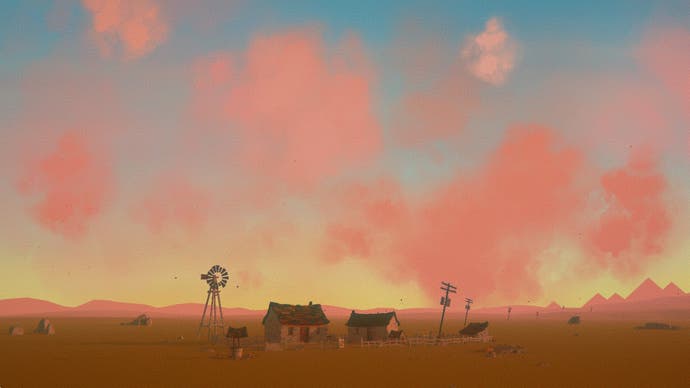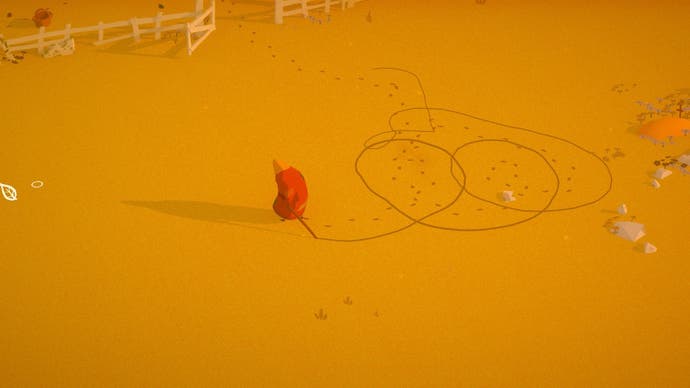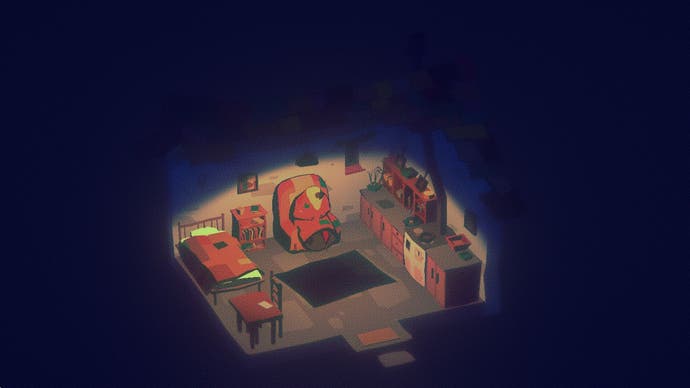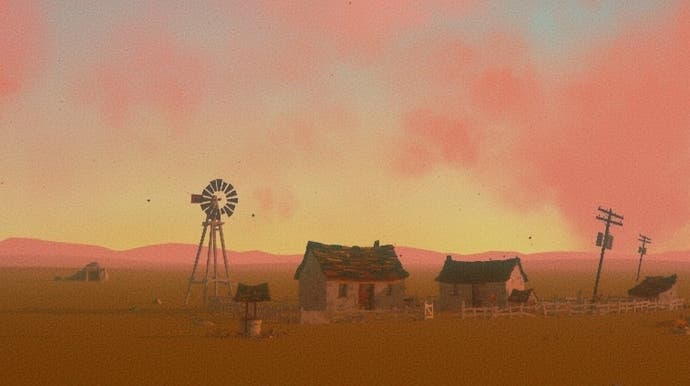Stark and beautiful, The Stillness of the Wind is a game of rare grace
Wind waker.
There's not much to The Stillness of the Wind, a slim, ethereal and wilfully arty survival game that's just launched on Switch, PC and iOS. There's not very much to it at all. You're Talma, an elderly woman who's seen her friends and family slowly depart for the city over time, leaving her alone to tend to a farm shared by a handful of chickens and a couple of wiry goats. It's a small, sparse space, bordered by tatty picket fences that don't do much to keep the encroaching desert out. Beyond those fences, amidst those sands, there's nothing save a few rocks and, after a handful of days, some sprouting mushrooms.
And those days are spent doing not very much at all. You can plant crops and tend to them, perhaps see to the chickens and collect any eggs, or take milk from the goats and head to the small outhouse to make cheese. You can take those goods and trade with the traveller that stops by every evening to gossip and pass on mail from the city. It's Stardew Valley, stripped back and dosed up to dozing point on mogadon.

Or, you could do none of that; go for a wander in the desert, perhaps, or take the stick that sits in your tatty front garden and drag it through the sand, drawing crude pictures as you go. I picked up that stick some two hours into The Stillness of the Wind, having begun to feel frustrated at its lack of drive or urgency, at its reluctance to give me any sense or idea what to actually do. And when I dragged that stick out through the front garden, opened up the fence and decided to set about my own adventure out in the barren wilds, something strange happened. Talma, who'd been near mute the entire time, began to laugh; a playful, disarmingly natural sort of laugh that took glassy eyes of boredom and in an instant managed to prick them with tears.

What power, all from a game that clearly makes a virtue of its emptiness, and the funny thing about emptiness is it can take a while to appreciate it. It's a moment that put me to mind of something I'd read recently about the films of Tarkovsky - a noted influence on The Stillness of the Wind - by the late cultural theorist Mark Fisher. "So often," he'd said, "nothing happens. Or rather, nothing happens narratively. But in refusing to yield to the crude urgencies of the everyday, Tarkovsky's camera reveals that everything - the dripping and flow of water, the gentle breath of the wind - is already an event."

Maybe that goes a little towards explaining why a laugh can feel so momentous, and how armed with a new mindset the small details in The Stillness of the Wind begin to take on much more significance. The dreams that wake you in the middle of the night; the sound of laughter carried on the wind for who knows how many miles across the impassable expanse; the film-grain that dances across the texture of the screen like a cataract gaze, or like the thin gauze of memory. There's power even within the few rocks you chance across out in the sands, each one provoking some memory or other of those who've moved on and left Talma alone.
It's a small shame, then, that the writing is a little too fudgy, too wrapped up in its own portentousness to let the same sort of humanity you see in Talma's slow, weary walking animation shine through. It's that writing, through letters and books you're free to flick through as the nights draw in and before you rest in bed, that carries so much of the drama that happens off-screen in some distant city, but it's been robbed of impact by some of its clumsiness.
Still, it's not enough to rob The Stillness of the Wind of its special something. As my mind began to wander again, I returned to another thing Fisher wrote about Tarkovsky, of the power of his films in light of the hyper-stimulation of the modern age. "The awareness of our own nothingness," he said, "is a prerequisite for a feeling of grace." There's not an awful lot to The Stillness of the Wind, but it does possess something that few other games can boast of - that sense of grace. What a strange, magnificent thing it is.










